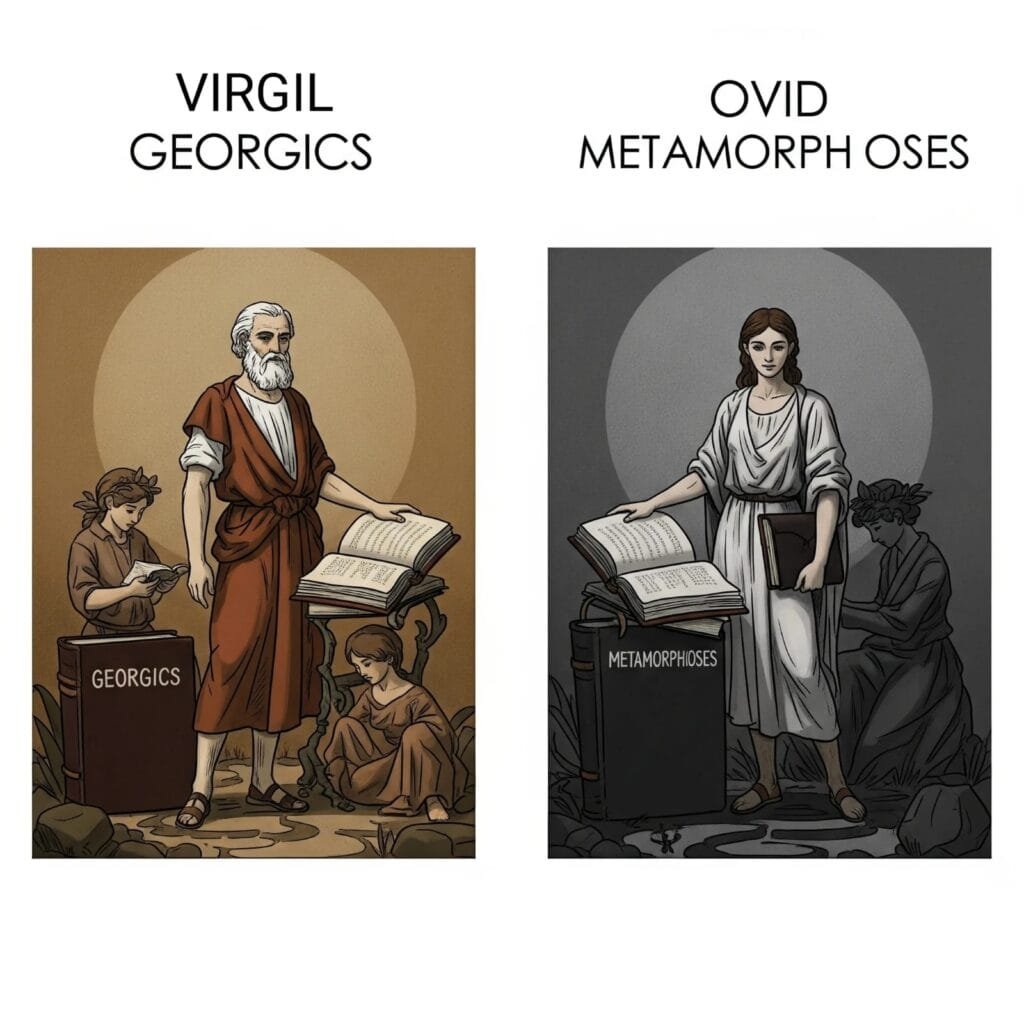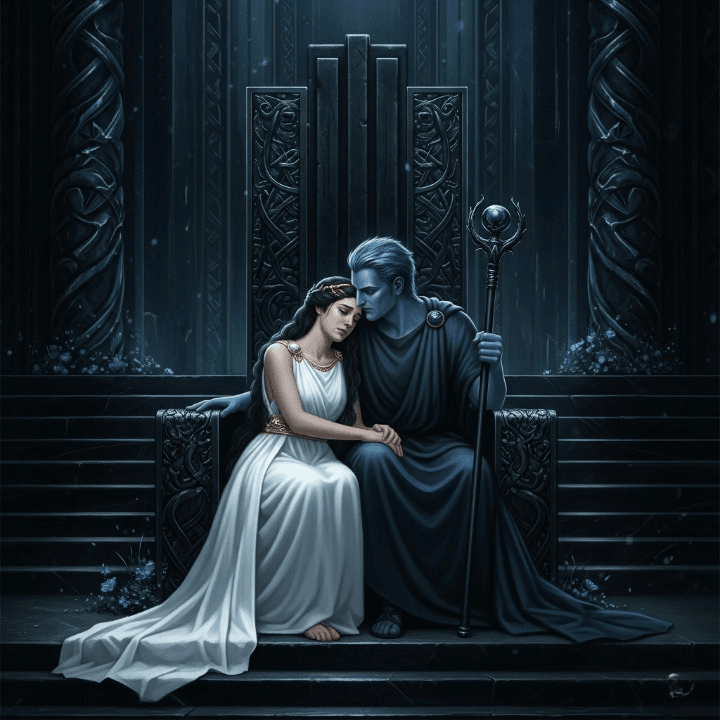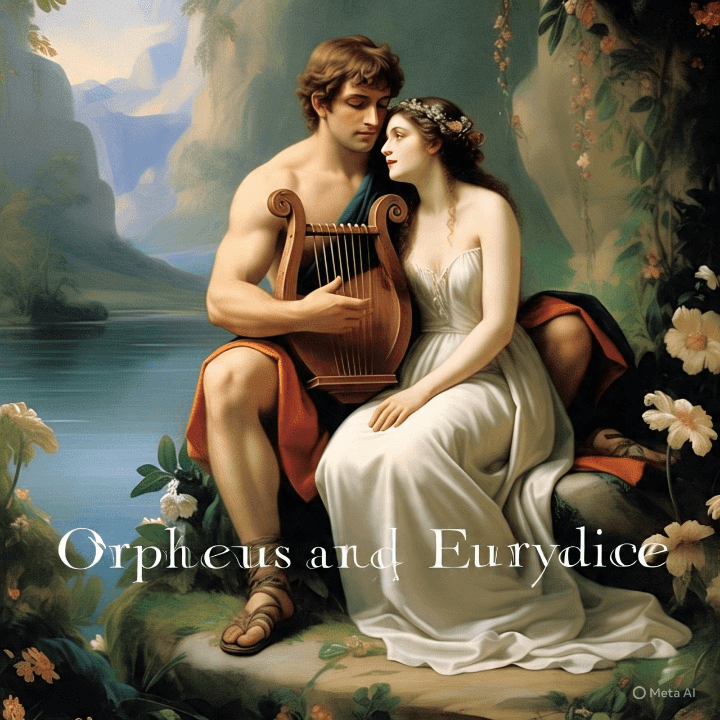Introduction: The Myth That Outlived Empires
This tale whispers to us from the first century BCE, when Rome was still a republic and poets like Virgil and Ovid immortalized Greece’s oldest stories. Though born from Greek myth, the legend of Orpheus and Eurydice survives today largely through Roman pens—scattered fragments in Greek texts, but fleshed out in Virgil’s Georgics and Ovid’s Metamorphoses. Our version follows Ovid’s telling, where love’s folly and fate’s cruelty collide with unmatched drama.

When you read versions of the Orpheus and Eurydice myth, you might encounter either “Hades” or “Pluto” as the ruler of the Underworld who grants Orpheus permission to lead Eurydice back to the land of the living. They are not distinct characters but rather different names or aspects of the same deity.
In my story, I have used “Pluto” to describe the god of the Underworld.
Now let’s begin the story.
The Land of Orpheus: Where Rivers Sang and Trees Danced
Orpheus was born in the wild, golden valleys of Thrace, where the wind carried the scent of pine and the rivers ran clear as melted silver. His home was a land of music—where shepherds’ flutes echoed through the misty hills, and even the wolves howled in perfect pitch.
His cottage stood at the edge of an ancient forest, its walls woven from oak and ivy. At dusk, fireflies flickered like fallen stars, and the nightingale’s song tangled with the murmur of the nearby River Hebrus, whose waters were said to whisper secrets to those who listened.

Orpheus’ Gift
The musician Orpheus needed only one thing: his gold-stringed lyre (not a mere lyre—this was an instrument whispered into existence by Apollo himself). When he played, the world stilled to listen:
- Wolves laid down their prey, eyes glazing like tamed pups.
- Oak trees groaned as they uprooted, leaning close enough to brush his shoulder.
- Even the mountains of Thrace shivered, their granite cheeks wet with unseen tears.
It was here, on a morning when the world dripped with dew, that Orpheus first saw Eurydice, as she appeared before him like a dream.

The Meeting: A Melody in the Meadow
She was gathering wildflowers when his music found her.
Orpheus had been playing a tune so light it made the air hum—a song of dawn and honey and things untouched by sorrow. Eurydice, barefoot and sun-kissed, turned toward the sound, her dark brown curls tangled with blossoms.
For a breath, they simply stared.
Then she laughed—a sound like water over stones—and said, “Do all the birds fall silent when you play, or is that just for me?”
He had no answer. His fingers, usually so sure, stumbled on the strings.
From that moment, they were bound—not just by love, but by something deeper. A recognition. As if the Fates themselves had plucked two threads and woven them together.
Eurydice’s Ears
She alone understood the soul behind his music. Where others heard skill, she heard the man—his joy, his fears, the way his breath hitched before a crescendo. Their courtship was a duet: his lyre, her laughter, the rustling grass keeping time. Every day for them was a new creation – sometimes a melody of love, sometimes the companionship of silence.

The Wedding Day:
On their wedding day, the forest itself celebrated:
- Vines wove arches overhead, heavy with honeysuckle.
- Foxes and fawns curled together, forgetting nature’s laws.
- Birds trilled in chorus, streams hummed along, and the wind carried their joy through the trees.
- The trees showered flowers from their leaves.
But fate is cruel to those who shine too brightly.
The Bite That Silenced Song and Turned Wedding into the Ash
As Eurydice danced barefoot in the meadow, a viper, hidden in the grass, struck. Its fangs pierced her skin, and before the sun could set, her breath stilled. The nymphs wept. The rivers ran black with mourning. And Orpheus—his hands, once so deft upon the strings, now clutched only emptiness. Orpheus’ lyre clattered to the ground as he sprinted toward her—but venom works faster than love.
By dusk, Eurydice’s lips were blue. By midnight, her bridal wreath adorned a funeral shroud.

Jupiter: The Thunderous Arbiter
When Eurydice died, Orpheus did not weep—not at first. He raged. Then, madness—or perhaps courage—took hold. If the gods will not return her to me, he thought, I will go to her. He climbed the slopes of Mount Olympus, his throat raw from shouting, until the sky itself darkened in warning.
Jupiter sat upon his throne of stormcloud, his beard threaded with lightning, his eyes like two chips of flint.
“You dare demand life from death?” the god boomed.
Orpheus did not flinch. “I dare nothing. I only ask.”
And then—he played.
The song was not one of worship or flattery. It was the sound of a heart cracking open.
Jupiter, who had hurled thunderbolts at Titans, who had toppled kingdoms with a thought, lowered his gaze.
“Go,” he rumbled. “But know this—the dead are not easily reclaimed.” There was a strange softness in Jupiter’s voice, as if he himself was saddened by this fate.

The Descent
No living man had ever dared the Underworld and returned. But Orpheus was no ordinary man.
At the banks of the Styx, Charon, the skeletal ferryman of forgotten souls, barred his way. “The dead do not pay in coin,” he rasped. “They pay in memory.”
Orpheus answered with his lyre.
The melody he played was one of loss so deep it hollowed the bones. Charon, who had not wept in a thousand years, let fall a single, dusty tear—and rowed him across the Styx. Orpheus landed on the opposite shore and made his way to the entrance of Pluto’s kingdom.

Cerberus: The Hound with Three Hungers
At the gates, Cerberus waited—a monstrous mass of muscle and gnashing teeth. Each head snarled with a different hunger:
- The first for flesh,
- The second for fear,
- The third for hope.
Orpheus played a lullaby his father once sang to him, slow and deep as a burial mound.
The beast’s ears twitched. The middle head whined.
And for the first time in eternity, Cerberus whined, lay down, and let him pass.

The Damned: A Gallery of Torments
The Underworld was a realm of unending pain. Orpheus stepped through its cavernous entrance, his lyre still singing. Its sweet melody drew the spirits, who gathered around him, eager to listen. The air of the Underworld itself sweetened for a moment, touched by the strings of his lyre, and all the souls in eternal torment briefly forgot their sorrow. Yet Orpheus ignored them all. He sought only his beloved Eurydice.

As he journeyed, he passed some of the Underworld’s most tormented souls:
The Danaïdes (The Damned Sisters)
The fifty Danaïdes—sisters who had slain their husbands on their wedding night—were cursed to an endless task: filling a fractured cistern that would never hold water.
Their arms shook with weariness, their garments clung soaked to their bodies, while the ceaseless drip from the broken vessel laughed at their hopeless toil.
Then came Orpheus’s song—
One sister paused. Her pitcher touched the ground, just for a heartbeat… And there, in that stolen moment, her lips curved into something forgotten—a smile untouched since her wedding day’s bloody turn.

Tantalus: A Moment’s Respite
The damned king stood immersed to his neck, the water shrinking from his lips each time he bent to drink. Above him, branches sagged with fruit—plump figs, glistening grapes—yet when he reached, they swung just beyond his grasp. Hunger and thirst had become his eternity.
Then—Orpheus played.
The music coiled around him like a cool mist. Tantalus’s straining hands fell still. His parched throat forgot its burning ache. For the first time in centuries, he felt the water’s chill without the cruel tease of its withdrawal. The notes settled on his tongue like dew, a fleeting sweetness to soothe the memory of drought.

Sisyphus’ Respite
The wicked king Sisyphus, his body glistening with eternal sweat, strained against the weight of his punishment—that accursed boulder that forever rolled back just shy of the summit. Muscle trembled against stone, breath came in ragged gasps, the endless cycle unbroken since time began.
Then—the music came.
His calloused hands stilled. The great rock settled. For the first time in ages, Sisyphus lowered himself onto the unmoving stone, feeling its solidity beneath him as something almost like peace. The sweat on his brow cooled. His lungs remembered stillness.
Yet Orpheus walked on, untouched by the miracle he’d wrought. His gaze pierced through the underworld’s gloom, seeing only shadows where Eurydice might be. The damned king’s moment of grace meant nothing to the living man who dared to love a ghost.

Pluto and Proserpina: The Dark King and His Stolen Queen
The throne room was carved from obsidian, the air thick with the scent of damp earth and dying embers.
Pluto sat like a mountain given form—his skin the grey of tombstone, his crown a circlet of jagged bone. His voice, when he spoke, made the ground tremble.
Beside him, Proserpina was winter and spring entwined. Her hair was a cascade of midnight, threaded with white asphodel flowers. Her fingers, pale as moonrise, clutched Pluto’s arm—not in fear, but in fierce possession.

The Bargain
Before the obsidian throne sat Pluto, lord of shadows, his form carved from darkness itself. Beside him shone Proserpina – a living ember in that dead realm, her pale face glowing like moonlight through smoke.
Pluto’s voice rumbled like distant thunder: “Mortal flesh has no place here. These gates open only for the dead.”
Orpheus fell to his knees, his words trembling with raw need. “Great Pluto, I come for Eurydice. You took her too soon – our joy had barely begun. If you remember how you claimed Proserpina from the sunlit world, if you recall that desperate love… grant me the same mercy. Return my bride, or let me stay. I cannot live without her. I will keep singing before your throne until your mercy awakens from its slumber.”

Orpheus’s Music and Pluto’s Judgment
As Orpheus sang his plea, a hush fell over Pluto. When Orpheus sang of Eurydice, it was Proserpina who wept first. The damned forgot their torments. Proserpina’s eyes welled with tears that gleamed like pearls as she pressed close to Pluto’s side, whispering words only gods could hear. Even Pluto’s iron grip on his scepter loosened.
After an eternity of silence, Pluto finally spoke. “Enough,” the god said at last. “Go. Take her.” His words echoed through the caverns. “Eurydice will follow, but listen well, mortal: no words, no pauses, no backward glances. If you look back before sunlight touches her, she is mine forever.”

The Walk of Shadows
The journey back felt endless. The path stretched longer than his descent into darkness, each step heavier than the last. Behind him, Eurydice’s footsteps were faint as a sigh—so close, yet untouchable. He ached to turn, to see if death had stolen the warmth from her cheeks or dimmed the light in her eyes. But he kept his gaze forward, jaw clenched, and walked.
Just a little farther.
The air began to change—damp cold giving way to warmth, the scent of earth softening into something alive. Then, a glimpse of gold: sunlight, filtering through the cracks of the underworld. The surface was near.

Moment of Doubt
But doubt crept into Orpheus’s heart.
What if she isn’t there? What if the gods deceived him?
His heart pounded. His resolve wavered.
And—he turned.
For one fleeting moment, she was there. Eurydice—real, breathing, her eyes full of love and fear. Then, like mist before the dawn, she faded.
“Orpheus—!” Her voice, desperate and fading, was the last thing he heard before the darkness swallowed her whole.

The Aftermath of a Broken Heart
Grief tore through Orpheus like a storm. He scrambled after Eurydice’s fading shadow, fingers clutching at empty air – but the Underworld had sealed itself against him. Some unseen force dragged him back to the living world, where sunlight now felt like an insult.
For years he wandered, his once-magical lyre now voicing only anguish. The melodies that had once charmed trees to dance now carried such sorrow that even river stones grew damp with what might have been tears.
When death finally came for him—whether by chance or by his own desperate invitation—his spirit didn’t hesitate, for death brought him the mercy life had denied. It flew swifter than any living feet could carry him, down through the dark paths he remembered so well.
And there, waiting at the shores of the Styx, stood Eurydice. No longer a fleeting shadow, but solid and real. Their embrace lasted longer than their entire marriage had.

The Reunion Beyond Death
This time, there were no rules, no conditions—just the reunion of two souls that transcended time itself. Death granted them the permanence that life had cruelly snatched away. Now, they could never be separated.
Now they walk together through Elysium’s eternal twilight, their fingers permanently entwined like roots of ancient trees. Sometimes Orpheus’ hand still drifts toward his lyre out of old habit—but then he catches the sound of Eurydice’s laughter, a melody that needs no accompaniment.
Her voice tells him stories as they wander: how the asphodel flowers smell after the first ghostly rain, how the light here never burns but always soothes, how she’d waited by the Styx counting centuries until he came.
He listens. Really listens this time.
And when she pauses to press her forehead against his, the lyre at his back stays silent. Some joys are too perfect for music.
No longer would they be parted, one from the other, as Eurydice’s laughter had become Orpheus’s music—without strings, without notes.

Frequently Asked Questions (FAQs)
Q1: Who were Orpheus and Eurydice in Greek mythology?
Orpheus was a legendary musician, poet, and prophet in ancient Greek mythology. Eurydice was his beloved wife, a nymph or mortal woman depending on the version. Their love story is one of the most tragic and enduring myths of ancient times, centered on Orpheus’s attempt to bring her back from the Underworld.
Q2: What instrument did Orpheus play?
Orpheus was renowned for playing the lyre, a stringed instrument often associated with the god Apollo. His music was so enchanting that it could charm animals, trees, and even rocks, and could move the gods of the Underworld.
Q3: Why did Orpheus lose Eurydice again?
Orpheus was allowed to lead Eurydice out of the Underworld on one condition: he could not look back at her until they both reached the surface. Just before exiting, doubt overcame him, and he turned around—causing her to vanish forever.

Q4: Is the story of Orpheus and Eurydice Greek or Roman?
The myth originated in Greek mythology but was preserved and popularized in Roman literature. The most well-known versions are from Virgil’s Georgics and Ovid’s Metamorphoses—both Roman poets retelling an older Greek tale.
Q5: What does Orpheus symbolize in mythology?
Orpheus symbolizes the power of art, music, and poetic expression. He is often seen as a figure who bridges the mortal and divine through the emotional force of his music. His journey also reflects the eternal struggle between love and death.

Q6: What is the main message of the myth of Orpheus and Eurydice?
The myth explores themes of love, trust, fate, and the limits of human desire. It shows that even the greatest talents—like Orpheus’s music—cannot always overcome destiny. The story teaches the pain of loss and the consequences of doubt.
Q7: Did Orpheus and Eurydice ever reunite?
In most classical versions, they are never reunited in life. However, many later retellings—including this story—offer a more hopeful ending where they are finally reunited in the afterlife, walking together forever in peace in Elysium.

Q8: What is Elysium in the context of this myth?
Elysium, also known as the Elysian Fields, is a section of the Underworld in Greek and Roman mythology. It’s often depicted as a paradise where heroes and virtuous souls go after death. In the story of Orpheus and Eurydice, it’s the peaceful realm where Orpheus’s spirit finally reunites with Eurydice’s spirit, never to be parted again.
Q9: What lessons can modern readers take from the myth?
Modern readers can see this story as a reflection on grief, trust, and the beauty of love that transcends death. It resonates deeply because it mirrors real emotional experiences: losing someone too soon, questioning fate, and holding onto hope.

Q10. What was the role of Pluto and Proserpine in the myth?
Pluto (Hades in Greek myths), ruler of the Underworld, allows Eurydice to return on the condition that Orpheus not look back. Proserpine (Persephone) is often portrayed as sympathetic, moved by Orpheus’s song and interceding on his behalf.
Q11. Why is the myth of Orpheus and Eurydice still relevant today?
Because it captures universal emotions—love, grief, hope, and loss—in a deeply poetic way. Whether interpreted as a romantic tragedy or a reflection on human frailty, its themes remain timeless and moving.

- 14 Best Panchatantra stories in hindi
- 15 Best Children Stories in English from Panchatantra 2.0
- 16 Best Aesop's Fables in Hindi with moral lessons
- 17 Best Aesop's Fables with moral lessons for children
- Arabian Nights
- Author's Best Written Stories in English
- Author's Best Written Stories in Hindi
- Baital Pachisi बैताल पचीसी in Hindi
- Bedtime Stories for All
- Hindi Love Stories
- Love and Romance
- Vikram and Betal series: Riddle Solving Stories
You can join my WhatsApp Channel by clicking the link here



